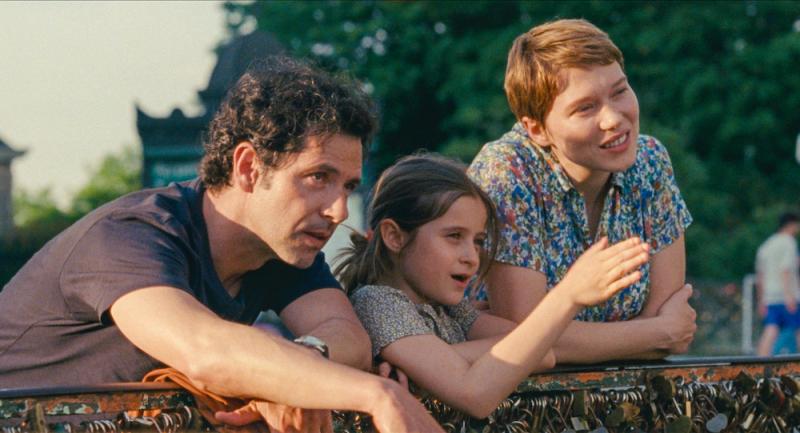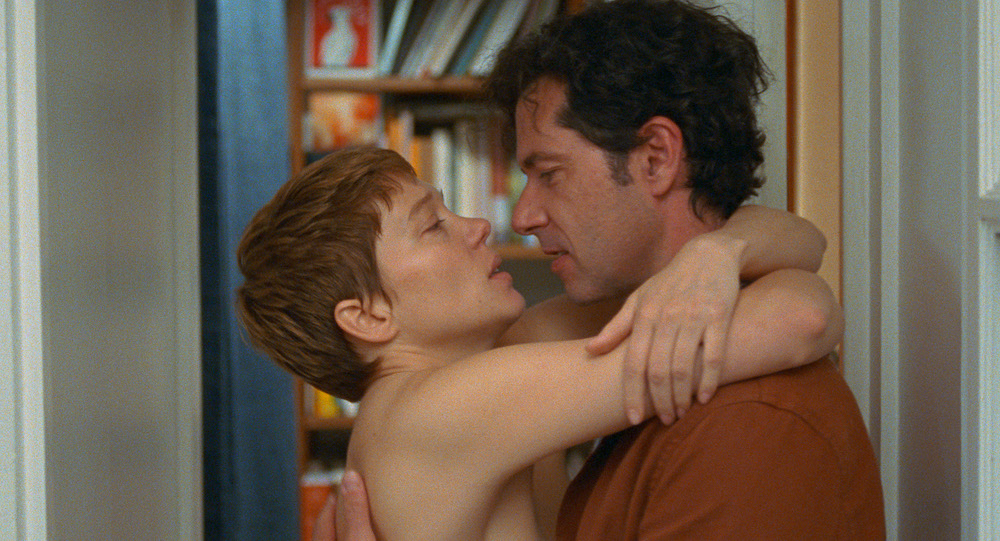One Fine Morning review - Léa Seydoux stars in Mia Hanson-Løve's poignant love story | reviews, news & interviews
One Fine Morning review - Léa Seydoux stars in Mia Hanson-Løve's poignant love story
One Fine Morning review - Léa Seydoux stars in Mia Hanson-Løve's poignant love story
A father in a care home and a passionate affair: the density of real life

In the first scene of Mia Hanson-Løve’s wonderful One Fine Morning, Sandra (Léa Seydoux in a minimal, nuanced performance), is trying to visit her father, Georg (Pascal Greggory), in his Paris flat. But, stuck on the other side, he can’t find the door or turn the key to let her in.
He’s unreachable in more ways than one: he has Benson’s syndrome, a neuro-degenerative disease that is similar to dementia and affects speech and vision, a particularly cruel fate for a professor of philosophy whose life has been devoted to thinking and reading.
This end-of-life sadness is juxtaposed, in a beautifully balanced way, with erotic passion. Sandra and Clément (Melvil Poupaud), an old friend, are having an intense affair, fraught with difficulty - but there's great chemistry. He’s married with a young son, she’s been widowed for five years and has an eight-year-old daughter, Linn (a charming, natural Camille Leban Martins), who bursts out laughing when she finds Clément in her mother’s bed one morning. Sandra, short-haired and unadorned, works as an interpreter – ironic, as her father has lost his way with words while she’s steeped in their meaning, though always at a remove. Like many of Hanson-Løve’s films – The Father of My Children, Things to Come, Bergman Island – it is semi-autobiographical: her father, who died during the pandemic, was a philosophy teacher and had the same horrible illness. Georg (Pascal Greggory, pictured above with Léa Seydoux as Sandra) has to give up his flat and Sandra, her sisters and their mother dispose of his precious books (these are taken from Hanson-Løve's father's library). His soul now lies in them rather than in his physical body, Sandra explains to Linn. Georg can no longer read and even his favourite Schubert sonatas are too painful for him to listen to. “In 30 years, if I have the same illness, promise me you’ll help euthanise me before it’s too late,” Sandra begs Clément. She’s not joking.
Like many of Hanson-Løve’s films – The Father of My Children, Things to Come, Bergman Island – it is semi-autobiographical: her father, who died during the pandemic, was a philosophy teacher and had the same horrible illness. Georg (Pascal Greggory, pictured above with Léa Seydoux as Sandra) has to give up his flat and Sandra, her sisters and their mother dispose of his precious books (these are taken from Hanson-Løve's father's library). His soul now lies in them rather than in his physical body, Sandra explains to Linn. Georg can no longer read and even his favourite Schubert sonatas are too painful for him to listen to. “In 30 years, if I have the same illness, promise me you’ll help euthanise me before it’s too late,” Sandra begs Clément. She’s not joking.
Georg moves between nursing homes, three of which are places – sadly familiar to anyone who’s had a parent in this situation – where Hanson-Løve’s father stayed. The stress involved in finding somewhere remotely adequate is shown, not surprisingly, with great authenticity and compassion. In one place, disoriented, bedraggled people constantly wander in and out of Georg's room. But the last, in Montmartre, is better, more lively, and he starts to stand up straighter.
Françoise, Sandra's eccentric mother (a sparklingly funny Nicole Garcia), left Georg some years before and doesn’t offer Sandra much support. She is a climate activist, tearing down pictures of Macron even though she voted for him – “You can be for and against at the same time. Too complex for you to understand,” she tells her eye-rolling partner – and is always eager to be held in the cells for civil disobedience. Not an obviously maternal type, she’s forgotten her daughters’ childhoods. “I remember my professional life but otherwise – black-out,” she says gaily. “You do realise the enormity of what you’re saying?” asks Sandra, and you understand her strength and underlying vulnerability. Clément (Melvil Poupaud, pictured above with Seydoux) is a cosmo-chemist (she calls him an astrophysicist by mistake), often off on far-flung expeditions to search for extraterrestrial dust, and their flirtation begins after he shows her his isotopic imaging machine. Well, of course it does. But although he and his wife have grown apart, leaving her is not so easy and heartbreak is inevitable, with Sandra often in tears, lonely and isolated, waiting for his texts like a teenager, getting distracted in her sound-proof booth when doing simultaneous-interpreting for an English conference about railways.
Clément (Melvil Poupaud, pictured above with Seydoux) is a cosmo-chemist (she calls him an astrophysicist by mistake), often off on far-flung expeditions to search for extraterrestrial dust, and their flirtation begins after he shows her his isotopic imaging machine. Well, of course it does. But although he and his wife have grown apart, leaving her is not so easy and heartbreak is inevitable, with Sandra often in tears, lonely and isolated, waiting for his texts like a teenager, getting distracted in her sound-proof booth when doing simultaneous-interpreting for an English conference about railways.
The action plays out over a year, with Hanson-Løve and cinematographer Denis Lenoir creating a marvellously real world that’s never static or forced. We see the seasons and the light change as Sandra strides through the streets of Paris, taking the metro and the bus to work, to Linn's school or to visit her father, processing the emotions that assail her.
A day out on the river ends abruptly when Clement spots a friend of his wife and they have to rush off, much to Linn’s baffled annoyance. “I’m done being your mistress. I can’t stand it any more,” says Sandra, and Clement leaves yet again, with Linn developing a mysterious limp that’s probably connected to his absence. Yet there’s joy to be found in everyday things, such as when the adults act out, for the kids, a hilariously over-the-top arrival of Father Christmas and his reindeer. There’s no idealising, no sentimentality, but a happy ending is still on the cards.
rating
Explore topics
Share this article
The future of Arts Journalism
You can stop theartsdesk.com closing!
We urgently need financing to survive. Our fundraising drive has thus far raised £49,000 but we need to reach £100,000 or we will be forced to close. Please contribute here: https://gofund.me/c3f6033d
And if you can forward this information to anyone who might assist, we’d be grateful.

Subscribe to theartsdesk.com
Thank you for continuing to read our work on theartsdesk.com. For unlimited access to every article in its entirety, including our archive of more than 15,000 pieces, we're asking for £5 per month or £40 per year. We feel it's a very good deal, and hope you do too.
To take a subscription now simply click here.
And if you're looking for that extra gift for a friend or family member, why not treat them to a theartsdesk.com gift subscription?
more Film
 The Ballad of Suzanne Césaire review - a mysterious silence
A black Caribbean Surrealist rebel obliquely remembered
The Ballad of Suzanne Césaire review - a mysterious silence
A black Caribbean Surrealist rebel obliquely remembered
 Harvest review - blood, barley and adaptation
An incandescent novel struggles to light up the screen
Harvest review - blood, barley and adaptation
An incandescent novel struggles to light up the screen
 Friendship review - toxic buddy alert
Dark comedy stars Tim Robinson as a social misfit with cringe benefits
Friendship review - toxic buddy alert
Dark comedy stars Tim Robinson as a social misfit with cringe benefits
 S/HE IS STILL HER/E - The Official Genesis P-Orridge Documentary review - a shapeshifting open window onto a counter-cultural radical
Intimate portrait of the Throbbing Gristle & Psychic TV antagonist
S/HE IS STILL HER/E - The Official Genesis P-Orridge Documentary review - a shapeshifting open window onto a counter-cultural radical
Intimate portrait of the Throbbing Gristle & Psychic TV antagonist
 Blu-ray: Heart of Stone
Deliciously dark fairy tale from post-war Eastern Europe
Blu-ray: Heart of Stone
Deliciously dark fairy tale from post-war Eastern Europe
 Superman review - America's ultimate immigrant
James Gunn's over-stuffed reboot stutters towards wonder
Superman review - America's ultimate immigrant
James Gunn's over-stuffed reboot stutters towards wonder
 The Other Way Around review - teasing Spanish study of a breakup with unexpected depth
Jonás Trueba's film holds the romcom up to the light for playful scrutiny
The Other Way Around review - teasing Spanish study of a breakup with unexpected depth
Jonás Trueba's film holds the romcom up to the light for playful scrutiny
 The Road to Patagonia review - journey to the end of the world
In search of love and the meaning of life on the boho surf trail
The Road to Patagonia review - journey to the end of the world
In search of love and the meaning of life on the boho surf trail
 theartsdesk Q&A: actor Emma Mackey on 'Hot Milk' and life education
The Anglo-French star of 'Sex Education' talks about her new film’s turbulent mother-daughter bind
theartsdesk Q&A: actor Emma Mackey on 'Hot Milk' and life education
The Anglo-French star of 'Sex Education' talks about her new film’s turbulent mother-daughter bind
 Blu-ray: A Hard Day's Night
The 'Citizen Kane' of jukebox musicals? Richard Lester's film captures Beatlemania in full flight
Blu-ray: A Hard Day's Night
The 'Citizen Kane' of jukebox musicals? Richard Lester's film captures Beatlemania in full flight
 Hot Milk review - a mother of a problem
Emma Mackey shines as a daughter drawn to the deep end of a family trauma
Hot Milk review - a mother of a problem
Emma Mackey shines as a daughter drawn to the deep end of a family trauma
 The Shrouds review - he wouldn't let it lie
More from the gruesome internal affairs department of David Cronenberg
The Shrouds review - he wouldn't let it lie
More from the gruesome internal affairs department of David Cronenberg

Add comment